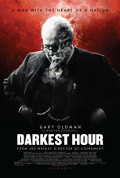
Directed by
Joe Wright
125 minutes
Rated PG
Reviewed by
Bernard Hemingway


Darkest Hour
Synopsis: It’s May 1940 and Britain is facing imminent invasion by the German army. In desperation, the coalition Parliament sacks Conservative Prime Minister Neville Chamberlain (Ronald Pickup) and replaces him with Winston Churchill (Gary Oldman).
The other side of the coin to Lone Scherfig’s 2016 "frafully" British WWII dramedy, Their Finest and a somewhat less flattering study of the iconic statesman than last year’s Churchill, not to mention being a worthy companion piece to Christopher Nolan’s relatively recent Dunkirk, Joe Wright’s film is a historically dense account of a pivotal moment in WWII and a showcase for Gary Oldman’s acting skills, one which will take him to the Oscars as surely as did Lincoln (2012) for Daniel Day-Lewis even if the film does not have the sweep or broad appeal of Spielberg’s outing.
Indeed Darkest Hour is a close study of the British Prime Minister’s desperate attempts in May 1940 to save Britain from the Nazi boot while battling personal political opposition in his own party, an unsympathetic King George VI (played in a mature and confident performance by an unlikely Ben Mendelsohn), a hostile war Cabinet and his own impetuous, irascible temper. His tower of strength in this dark time is his devoted wife, Clemmie (Kristen Scott Thomas). Whilst clearly some of what we see is speculative, Anthony McCarten’s screenplay feels historically sound although a scene late in the film which serves to facilitate Churchill’s change of heart on negotiating with "Herr Hitler" seems to take artistic license too far, particularly as one is beginning to feel slightly worn out by this time with all the intriguing.
Partly this is due to the relatively dry subject matter, only slightly relieved by Churchill’s interactions with Clemmie and his young personal secretary, Elizabeth (Lily James), partly due to Bruno Delbonnel’s low-lit, colour-leached, near black and cinematography. Presumably the latter was designed to minimize any deficiency in Oldman’s astonishing (yes, it worked) prosthetic make-up but did everything really have to be so dark? The House of Commons looks like a Rembrandt painting and George IV might as well have been suffering from photophobia. There are a few outdoor scenes but these are invariably overcast. True, this is England but it seems to be taking the film’s title a little too literally.
Immaculate as the production design is, intriguing as it is as a historical thriller (Dario Marianelli’s score is particularly effective in this respect), it is Oldman’s mesmerizing performance that carries the day. His (and/or screenwriter McCarten’s) Churchill is more abrasive than was Brian Cox’s in Jonathan Teplitzky’s film but ultimately it is sympathetic (although one might say that this is because Churchill happened to get away with his rhetorical bluster, Dunkirk being his salvation as much as it was Britain’s). Here the device of using Clemmie as both a scolding and a supportive wife (as the occasion fits) works well to regulate our perception of the man as legend. Wright leaves us feeling that we know both well (end titles tell us that Churchill was defeated in the post-war election but offers no explanation why, which is a tad disappointing, Something sobering to round off proceedings would have been nice).
History buffs and those who grew up in the shadows of Britannia's empire will be well-rewarded by Darkest Hour.
FYI: For some insight into Churchill's origins and personal psychology Richard Attenborough's Young Winston (1972) is worth a look. Gary Oldman did indeed win the Best Actor Oscar, beating fellow nominee Daniel Day-Lewis for his performance in Phantom Thread.
Want something different?





